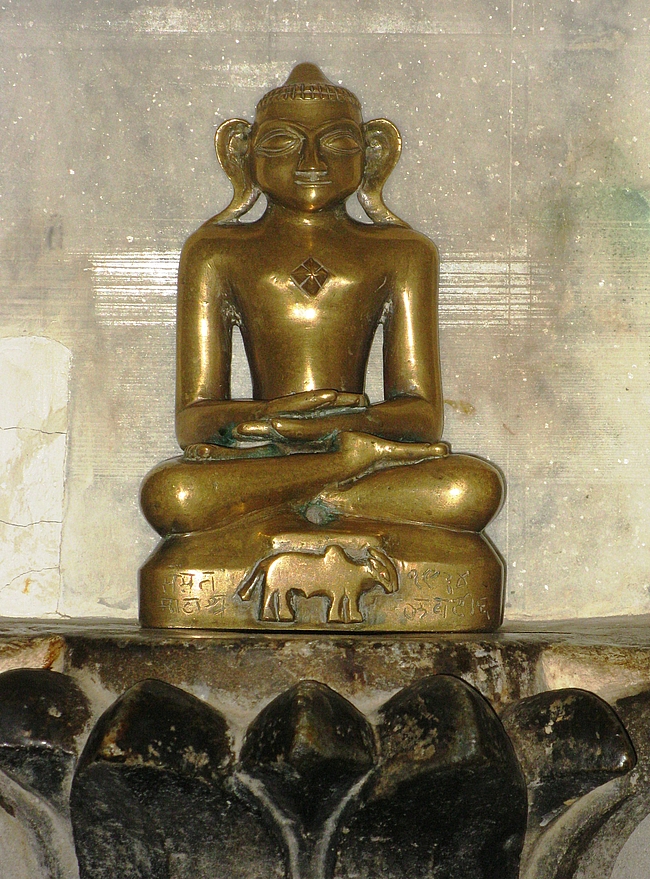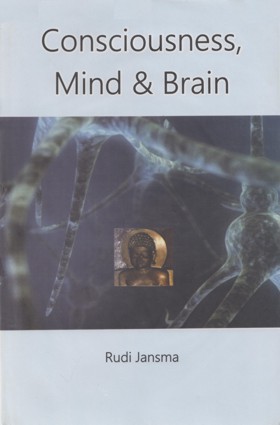
Adinath, The First Lord, in the Adinath Digambar Jaina temple Todaraisingh, Rajasthan
Theosophy in its true and original sense is the divine wisdom or wisdom of the gods from which all other religions and genuine thought systems are derived. If one studies the sacred literatures of the world one will find many hints to the existence of such a universal Theosophy. Theosophy is more than intellect alone, indeed pure and penetrating intellect is but one phase or principle that develops during evolution and specifically the human evolution. In this article on the origin of intellectual knowledge we go back to ancient times. Intellect is the very tool towards godhood which is rather a transcending of intellectual knowledge, but certainly not a discarding of it. Even the Buddhas have an intellect and a much better one than the average human, because it is clear as crystal, free from bias and free from delusion and is intimately intertwined with goodwill and universal compassion. In this sense Theosophy stands apart from particular popular opinions in our society who tend to believe perhaps as a reaction on the overburdening in our time of our minds with school-intellectual knowledge that the intellect is an obstacle and something unnecessary. We firmly oppose the 'new-age' view that one can reach 'enlightenment' in easy and pseudo-occult ways. The intellect has guided us through many lifetimes and continues to do so, but all its aberrations and illusions should and will ultimately be overcome. Mind is the cause of all manifested existence, and of all evolution and development of Nature and Culture.
We should also be aware that the tree of the intellect has very many branches, and that humanity goes through many different phases and that in some parts of humanity the emphasis of evolution is not (yet) in the intellect. Nevertheless, the word 'man' itself derived from the Sanskrit verb-root 'man' that means 'to think'.
In, for example, the ancient philosophy-science-religion of Jainism which is in its origin can be called an ancient form of pre-Buddha Buddhism, antedating Gautama the Buddha from prehistoric times our present cycle of cultural, higher mental and spiritual development was begun probably some millions of years ago. That was at the very beginning of cultural development of the fifth Root-race[1] (to use a modern term applied in present-day theosophical literature) by one individuality known as the original or 'first Lord', Adinātha ((Ādinātha. (Sanskrit) First or Original Lord. The first of the 24 Jain Tīrthaṅkaras (lit. makers of a shallow passage) or 'Jain Buddhas' of the present down-ward half-cycle or avasarpinī (Theosophically the Fifth Root-race) whose name was Ṛṣbha (lit. 'bull') and who is said to have lived 8,400,000 years.)) an enlightened man, not a god in the popular sense of the word as some divine entity residing in or descending from 'heaven'. He taught in his time pure religion for ages to come to thousands of followers. However then only two people (who were also his 'sons' i.e. main chelas or disciples) are said to have been able to completely practice his discipline and reach liberation from all mundane fetters.
They ultimately reached full enlightenment in this life. All others, in their high, but still imperfect understanding, laid the basis for the several hundreds of other religions (363 different religions to flourish over time, according to the Jains) which came and went or are still existent. Adināth taught humanity, in his long 'life' of 8,400,000 years (not physically of course) through his hundred sons and two daughters, in all that was needed in the coming millions of years.[2] We today are still living under his influence, i.e. in his period, until a next cycle, when a like figure or 'fordmaker' (tīrthaṅkara), will in rather remote future appear among humankind. The original wisdom itself is philosophical, religious and scientific at the same time.

Helena P. Blavatsky (1831-1891) Founder of the modern Theosophical Society (New York, 1875)
The risk of any religion based on doctrines that are not completely graspable by average humanity is dogmatization and crystallization: some claim to know the only 'right interpretation', and say that 'nothing may change because it would be an assault to the original preceptor.' But did not all systems teach us that change (movement) is the very nature of being? Did not all religions show us a path towards ever more perfect intellectual and spiritual accomplishment? Theosophists do not just macaw half-understood sayings intellectual or not of whatever holy scriptures, but progress by means of investigation
All modern tools are at the disposal of any intelligent human to make intellectual progress. The Theosophy of the ages has much to say, in the form of some hints, that may help science forward without ever jumping to manmade dogmas and fancies about a creating and designing 'God', nor does it need a 'big bang', a 'survival of the fittest,' or 'selfish gene,' 'collapsing wave functions,' etc. and get stuck there. Science will deepen out some of these ideas and then either transcend or abandon them. All these ideas are evanescent parts or steps on the ladder of the struggle of the human mind towards expansion and they prepare us for choices the mind has to make in the future. Theosophy is of all times and understands the developments in all sciences and theories now and in the future. Scientific progress is part of the long pilgrimage of humankind towards deepening understanding on our plane of existence and other planes of existence in the future.
The Origin of Intellectual Knowledge
The scientific intellectual knowledge gained and theories formed by thousands of students and investigators throughout many centuries that we find reflected in ancient scriptures is amazing. Science is not something new it was not invented for the first time by the Greeks, the progenitors of modern western culture. How could ancient people even before the ancient Greeks without our technology of today have elaborated theories about atoms, molecules, chemistry, space, time, mathematics, the number zero, medicine, psychology, biology, a cosmology measured and calculated in quantities comparable to lightyears of distance, and talk about speeds comparable to the speed of light? They even talked about higher speeds in more subtle substances. ((Jainism, for example, recognizes at least 3 speeds: 1) that of material objects; 2) that of beings in a subtle body but without a physical one) and 3) the speed of the jīva consciousness itself, which is instantly and infinite.)) Thousands of years before present, scientists were already aware of other worlds, including many imperceptible for the normal senses (indeed most worlds), their size, properties and mathematical relations, and possibly of other solar systems and galaxies.
The time has come that ancient wisdom and modern investigation can join hands. Science should undo itself from the unrealistic assumption that there is nothing to believe outside the surface phenomena that we perceive with our senses. However great our instruments (and our pride of them), they are as nothing compared to our inner faculties still to be developed in future human evolution. We should study and enlighten our scientific facts by the universals of ancient knowledge.
 Dr. Rudi Jansma
Dr. Rudi Jansma
